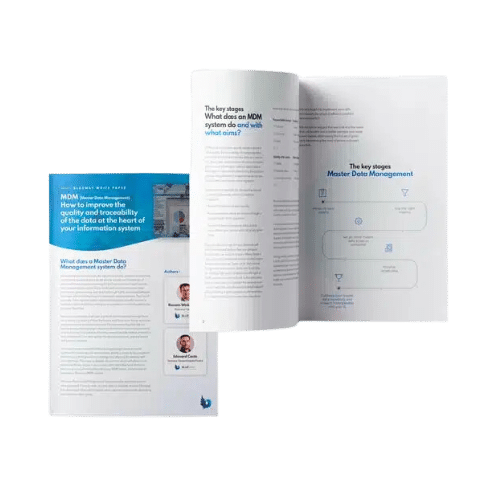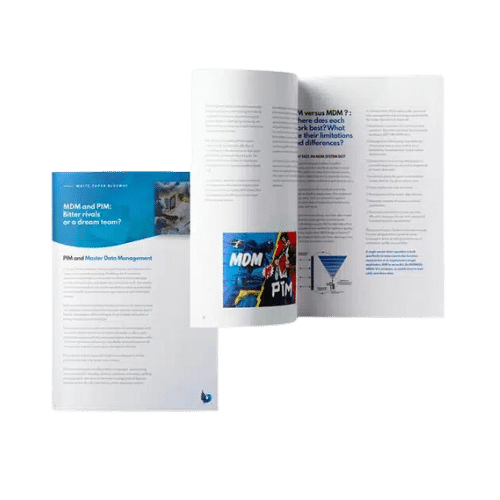In these days of big data, and as Marketing departments are shifting towards data-driven strategies, MDM (Master Data Management) systems have become absolutely essential to their success, given the extent to which customer-related data sources can be totally different from each other.
MDM: more and more customer data to integrate
The modern marketing manager faces a major business challenge, namely producing increasingly finely-tuned marketing segmentation in order to personalise messages sent to customers to the greatest possible extent, to improve the returns on their marketing activities. The indispensable pre-requisite to this process is the availability of a top-quality customer database.
The problem is that customer data is not held solely in the CRM (Customer Relationship Management) application, but is split across a number of different sources, including ERP (Enterprise Resource Planning), WMS , e-commerce websites, the new big data software being used by sales to generate leads, customer loyalty applications, and so on. Customer data is becoming crucial to the successful running of business processes, but in practically all businesses, it is still scattered across many different places.
An MDM (Master Data Management) solution truly meets marketing managers’ requirements because, using synchronisation mechanisms and centralised storage, it serves to integrate all the different sources of customer-related data. Having uniform, comprehensive customer data is potentially of huge benefit.

Master Data Management : data quality and traceability at the heart of your information system
Why have a single customer view in a Marketing master data system?
When customer master data records are integrated and unified within an MDM solution, Marketing departments gain 360° visibility over their customer data, giving them better understanding of their journeys, purchases, behaviour, etc. Such a comprehensive picture of the customer experience gives Marketing a sufficiently granular level of high-quality data that the returns on their activities are sure to show improvement.
For the real problem businesses face now is the non-quality of the data used by Marketing, which reduces the effectiveness of their efforts by at least 20% to 40%. The other business processes with a link to customer data should not be overlooked – accounting can send invoices to the wrong address despite CRM holding the right one, or send a late-payment reminder while Sales are in the middle of negotiating a new contract.
Working without a single customer view in an MDM system consequently means you run the risk of harming the efficiency of your business processes.
An MDM solution is the only way to integrate big data into customer master data
The revolutionary angle in data-driven marketing is the need to control substantial inflows of data from big data sources, and this is already indispensable in B2C if the aim is to implement more finely-tuned segmentation, as Marketing must be able to offer the right product to the right person at the right time.
An MDM solution will then be able to integrate and harmonise all customer master data, whether structured (customer records from ERP or CRM for example) or unstructured (semantic analysis of social media profiles, browsing data obtained by a mobile app, movement around a shopping centre obtained from IoT sensors, etc.). An MDM solution will give Marketing and Sales departments better knowledge of a customer’s overall behaviour patterns, and will improve their ability to suggest the right products and services at the right time.
An MDM solution will bolster the collaborative aspect between all customer-facing teams.
In these days of digital transformation, all businesses are striving for more collaborative working and agility in their teams. Modern digital tools do indeed facilitate this, but what about existing management software? We know their master data records are not always properly integrated – are you sure your CRM system is communicating with ERP or accounting as it should? Or that when customers update their details on your website, it triggers synchronisation to update the CRM so that your sales people have the right information?
Implementing an MDM master data repository for customer data means all customer-facing teams – Marketing, Sales, Customer services, consultants, etc. – can be sure they are using a single version of up-to-date customer records. In this way, an MDM solution removes barriers between how different departments operate, making the business more efficient and therefore more productive.
An MDM solution also facilitates cooperation between the functional business staff and IT teams as regards data governance. In fact, Blueway’s MDM module simplifies IT departments’ management of data streams using an ESB application bus, and provides natural language query and display screens for business users. Click here to find out more about the Data Governance module, Blueway’s MDM solution.

MDM versus PIM: bitter rivals or a dream team ?
Success stories about MDM Customer Master Data projects
Successful master data projects are those where the business requirements in terms of using and analysing a single customer view have been clearly expressed from the outset. A project to implement an MDM solution should not be approached solely from a technical viewpoint for the synchronisation of data streams, but should start with a clear expression of business requirements to quickly identify the project objectives.
This was the case with Loto Québec, for example, which decided to centralise all its data for 4.5m lottery players to provide a single customer view, using Blueway’s MDM solution. The project was implemented in six months, and the various application users on the business side are now certain to always have the most up-to-date data, plus finer customer evaluation and segmentation.
How to make a success of a customer and marketing master data project
A master data implementation project for a single customer view and to underpin marketing activities has to be run in stages, and the MDM system selected has to be sufficiently agile to be rolled out rapidly, and sufficiently upgradeable to continue to support you effectively through any changes to your information system.

Want to discuss your data management challenges with an expert?





